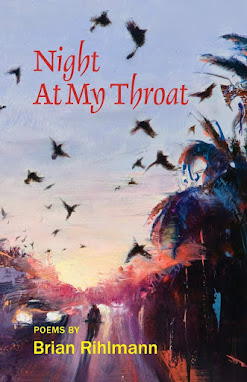Published by Unlikely Books.
Available on Amazon.
This book of poetry is different from any other I’ve ever read. For one thing, it spans nearly four decades with poems from the early ‘80s through today. There are collections of poems from long ago that read like they were written yesterday. The blazing arrow that binds them all together is Belinda’s no-bullshit in your face truth. You can tell that she found her poetry voice early and stuck with it.
By far the two most fascinating subjects in here for me were her poems about working as a hospice nurse and a nurse on a psych ward. “Late night at the psyche ward” from her collection Lummox Press Red Book Series #37 (2001) and “Notes of a human warehouse engineer” from Liquid Paper Press (1998,) are two collections that are not to be missed. “Notes of a human warehouse engineer” won first prize in the 1998 Nerve Cowboy Chapbook Contest. It’s easy to see why. Subraman curates vivid moments from her time there, expertly helping the reader understand the jarring and sometimes hectic atmosphere.
As a peer support specialist who has seen the inside of a psych ward and a crisis unit, I can say that it was interesting to see things from the perspective of a nurse. Belinda speaks of seeing people at their very worst and treating them with dignity, respect, and kindness. She is honest about the challenges of nursing work, teasing out difficult truths from her early morning hours there. She takes us to the very limits of her own patience with aplomb. She captures the often thankless moments of dealing with patients who are in psychosis, in the grips of dementia, in the throes of mania or schizophrenia. She talks about coming to terms with the limits of her own sanity in some of these situations and what comes out is a very humanizing view of mental health care and end of life care.
Many of her poems about the hypocrisy of religion, sprinkled liberally throughout the book, also really touched me. I applaud her bravery in writing about such difficult subjects openly and honestly, without fear of reproachment.
Some of the poetry, not on these subjects, is beat-like in nature. It is trippy in the best way, deeply philosophical, esoteric, and always blisteringly true. The beginning of the book offers an informative, in-depth introduction by the author.
There are countless reasons why picking up a copy of Left Hand Dharma is rewarding. Go forth, intrepid readers, and discover this gem for yourself.
From Late Night in the Psyche Ward
Peter is back after only eight days.
He was caught directing traffic, naked,
claiming to be Charlie Manson and Hitler.
He’s sunburned, scratched up.
His feet are cracked and cut
from walking barefoot.
His voice is garbled, sounds like he’s barking
with a mouth full of gravel.
But he continues dropping lists at the desk.
Some lists tell us who he is: “a homosexual and a lesbian
and Zar governor of the Andromeda Strain…”
Some tell us diseases he wants cured: “Soviet’s tongue,
Heineken’s Turmoil, defecation rot…”
Other lists tell us who he wants
at his “ordination breakfast”
where “wurlitzer coffee” is to be served.
He wants Clinton, Popeye, Queen of England,
Daffy Duck, Mortimer Snerd, King Tut…
In the past he’s told me
he sold dope to Jerry Garcia,
shot up with Grace Slick.
Said he likes “combo shotgun”
and rattled off a list of drugs.
He showed me “tracks” on his arm.
But I didn’t see much, two or three red dots.
And I just got his toxicology screen results.
Negative for all drugs.
His problem is his brain.
Schizophrenic for 50 years.
He’s basically harmless.
Claims to be God-fearing
and—God.
Belinda Subraman has been writing poetry since the 6th grade and publishing since college. She had a ten year run editing and publishing Gypsy Literary Magazine 1984-1994. She edited books by Vergin' Press, among them: Henry Miller and My Big Sur Days by Judson Crews. She also published Sanctuary Tape Series (1983-90) which was a mastered compilation of audio poetry and original music from around the world.
Belinda is a mixed media artist as well as a poet and publisher of GAS: Poetry, Art & Music video show and journal. Her art has been featured in Beyond Words, Epoch, Flora Fiction, Unlikely Stories, Eclectica, North of Oxford, Raw Art Review, El Paso News and Red Fez. She sells prints of her work in her Mystical House Etsy shop.

















